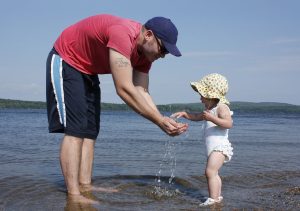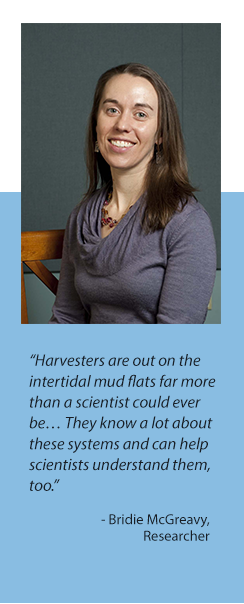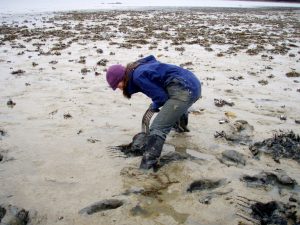Connecting Science & Decision-Making for Safer Beaches and Shellfish

The Mitchell Center recently led the development of a new partnership – the New England Sustainability Consortium (NEST) – that builds on the Mitchell Center’s innovative approach to problem-solving. NEST’s initial focus is on reducing risks of harmful bacteria and other microbial pathogens in coastal waters along the Gulf of Maine.
Shellfish beds are vulnerable to fecal bacteria washed in from the land and naturally occurring Vibrio bacteria that thrive in warming ocean waters. These organisms pose a looming public health threat with significant economic consequences. In the Piscataqua River estuary, for instance, every clam flat on the Maine side was closed last year due to bacterial contamination. As a result, livelihoods disappear and the economy suffers.
Harmful bacteria also affect beaches which is a major problem during the summer months. Keri  Kaczor, coordinator of the Maine Healthy Beaches program, works with 28 local managers to help protect public health at 55 Maine beaches. When unsafe conditions are detected, advisories are posted to prevent human exposure. During 2012 alone, 151 swimming advisory days occurred at these beaches. Posting beach advisories can have dire consequences for local businesses and managers are asking for improved decision-making tools.
Kaczor, coordinator of the Maine Healthy Beaches program, works with 28 local managers to help protect public health at 55 Maine beaches. When unsafe conditions are detected, advisories are posted to prevent human exposure. During 2012 alone, 151 swimming advisory days occurred at these beaches. Posting beach advisories can have dire consequences for local businesses and managers are asking for improved decision-making tools.
Shellfish landings and beach visitors are also important economic drivers for Maine and New Hampshire, bringing in between $150-$270 million annually to coastal economies.
To find solutions, Mitchell Center researchers are teaming up with colleagues at the University of New Hampshire, College of the Atlantic, and other institutions with support from a $6 million NSF EPSCoR grant. The researchers are collaborating with key stakeholders including shellfish harvesters, non-governmental organizations, and state regulators to determine how these public health risks are perceived and how they can be reduced. Based on their findings, the researchers aim to strengthen the scientific basis for making decisions regarding the management of shellfish harvesting and recreational beaches. Collaboration is important as it brings a broader range of knowledge to the decision-making process and creates a shared commitment to solutions.

“There is more than one kind of knowledge,” says Bridie McGreavy, a NEST postdoctoral fellow who is working with shellfishing communities. “Harvesters are out on the intertidal mud flats far more than a scientist could ever be. They are attuned to the tides and the changing environment. They notice patterns and see changes first because they are out there every day. Harvesters know a lot about these systems and can help scientists understand them, too.”
